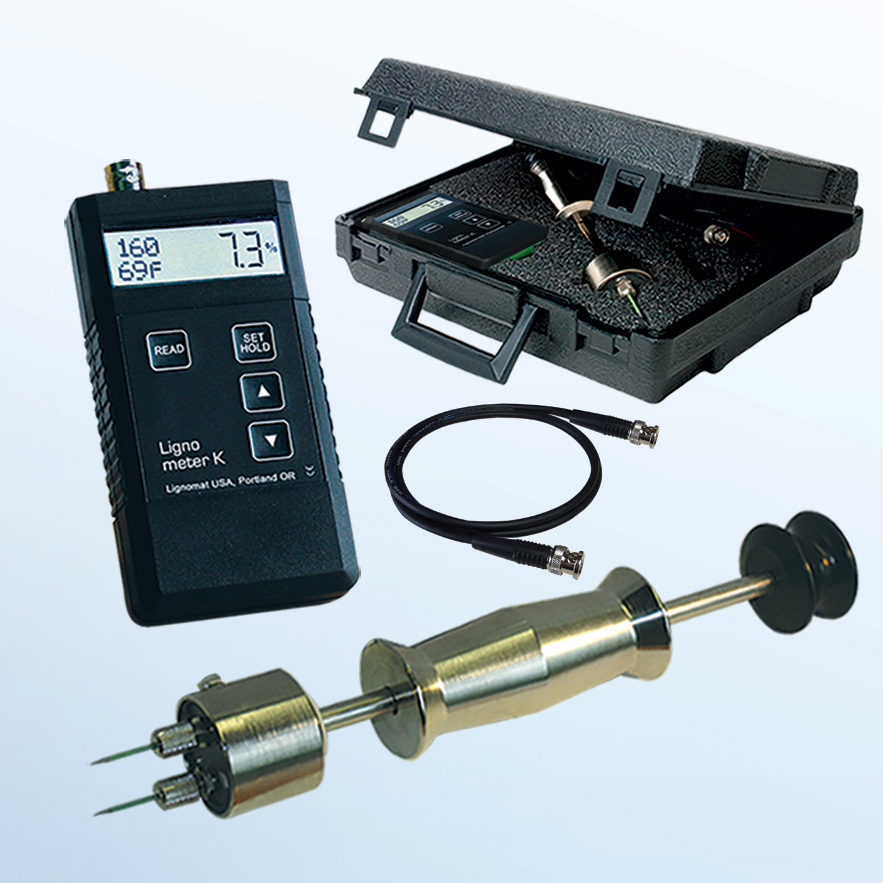The Ultimate Overview to Wetness Meters: A Comprehensive Summary and How They Can Save You Cash
Wetness meters serve as crucial devices in discovering and checking moisture web content in materials, helping in protecting against pricey damages and ensuring the top quality of items. Understanding the nuances of various kinds of wetness meters, their applications, and the prospective cost-saving advantages they supply can be a game-changer for businesses and experts alike.
Kinds of Dampness Meters
Various types of wetness meters are offered for various applications in numerous markets. One typical kind is the pin-type dampness meter, which gauges the electrical resistance between two pins placed into a product. This type appropriates for wood, drywall, and other structure products. Pinless moisture meters, on the other hand, use electro-magnetic sensor plates to scan a bigger location without creating damage to the material's surface area. Moisture Meter. These meters are excellent for promptly assessing moisture levels in huge locations such as wall surfaces and floors.

Furthermore, there are also specialty dampness meters created for details materials like dirt, grain, or hay. These meters provide precise wetness analyses tailored to the unique homes of the material being checked. Infrared moisture meters determine the thermal properties of a material to establish its moisture content non-invasively, making them valuable for applications where pin or pinless meters may not be suitable. Comprehending the different kinds of moisture meters available can assist markets choose one of the most appropriate tool for their certain wetness measurement demands.

Benefits of Making Use Of Dampness Meters
Moisture meters supply indispensable advantages in accurately examining and keeping an eye on moisture levels in diverse materials and environments (Moisture Meter). Among the primary benefits of utilizing wetness meters is the prevention of possible damage brought on by excess wetness. By detecting and addressing high wetness levels early, wetness meters assist to avoid mold growth, rot, and structural damages in structures, saving both time and money on repair services. In addition, moisture meters help in making certain the top quality of products during building and construction or production processes. By accurately determining wetness web content, these devices help maintain the stability of timber, drywall, concrete, and various other materials, lowering the threat of failings or defects.
Additionally, using wetness meters can lead to increased energy performance. In farming setups, dampness meters play an essential role in enhancing plant yields by allowing farmers to check dirt wetness degrees and make notified irrigation decisions.
How to Select the Right Moisture Meter
Choosing the ideal moisture meter involves considering crucial elements such as material compatibility, measurement array, and calibration accuracy. When selecting a wetness meter, it's vital to guarantee that the meter is suitable for the certain material you will be testing. Various materials have differing electric buildings that can affect wetness readings, so picking a meter created for your product is crucial for exact results. Additionally, think about the dimension series of the moisture meter. Make sure that the meter can detect moisture levels within the range required for your applications. Calibration precision is another important element to bear in mind. Go with a dampness meter with trusted calibration to make sure exact and consistent readings. Some meters may need periodic calibration modifications, so understanding the calibration procedure is necessary. By very carefully evaluating these aspects, you can choose a moisture meter that meets your requirements and supplies precise dampness dimensions for your tasks.
Proper Strategies for Dampness Meter Use

Cost Cost Savings With Moisture Meter Applications
Exactly how can the tactical utilization of wetness meters bring about significant price savings across various markets? Dampness meters play an essential duty in price savings by stopping prospective damages and making certain top quality control in different markets. In the agriculture sector, dampness meters aid in establishing the optimal time for gathering crops, stopping excess or over-drying moisture that can influence the last item's quality. This accurate surveillance helps farmers stay clear of unneeded losses and maximize their return.
Likewise, in building, wetness meters help stop expensive problems by finding wetness degrees in building materials, such as wood or concrete, which can bring about structural issues if not attended to without delay. By identifying issue areas early, contractors can take corrective measures to prevent substantial repairs or substitutes, eventually saving time and money.
In addition, in the food handling market, wetness meters are essential for checking product top quality and making sure conformity with safety and security laws. By accurately gauging wetness web content in food, makers can avoid spoilage, preserve quality, and minimize waste, causing significant cost savings. On the whole, the strategic application of dampness meters is a valuable financial investment that can bring about considerable price reductions and boosted efficiency across various markets.
Conclusion
Finally, wetness meters are important devices for determining and discovering dampness degrees in various products. By making use of the best moisture meter and complying with appropriate this contact form strategies, customers can successfully prevent pricey damages created by excess dampness. Investing in a high quality wetness meter can cause considerable expense savings in the long run by determining possible problems beforehand and making it possible for prompt remediation. Inevitably, wetness meters are important tools for preserving the stability and longevity of frameworks and materials.
Wetness meters offer as important devices in detecting and keeping track of moisture content in products, aiding in stopping pricey problems and making certain the top quality of products. Infrared moisture meters gauge the thermal residential properties of a material to determine its moisture material non-invasively, making them helpful for applications where pin or pinless meters may i was reading this not be suitable.Moisture meters provide invaluable advantages in precisely keeping track of and evaluating dampness levels in varied materials and atmospheres. In farming settings, moisture meters play a critical role in maximizing crop returns by making it possible for farmers to monitor dirt moisture degrees and make educated irrigation choices.In verdict, moisture meters are important tools for detecting and determining moisture levels in numerous products.